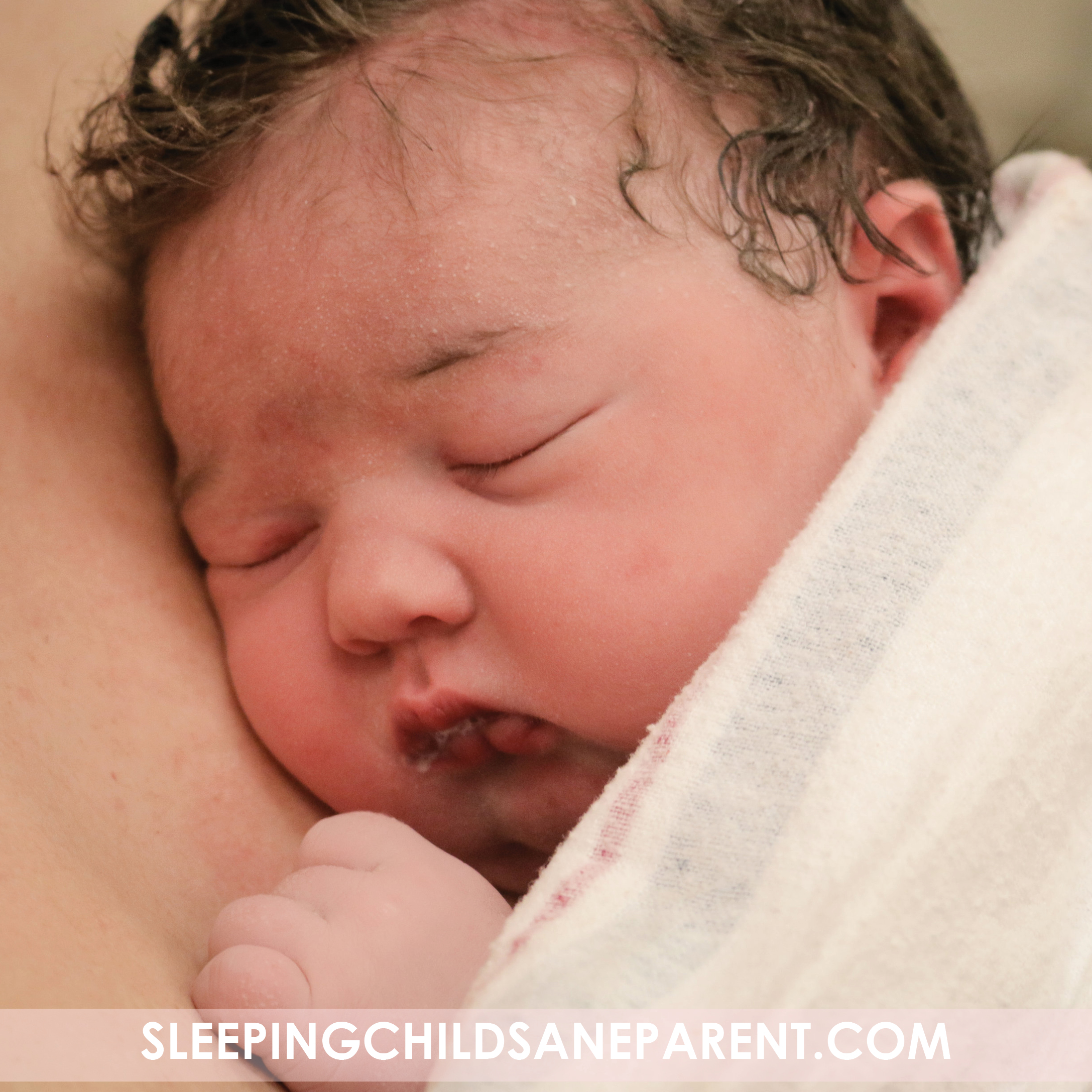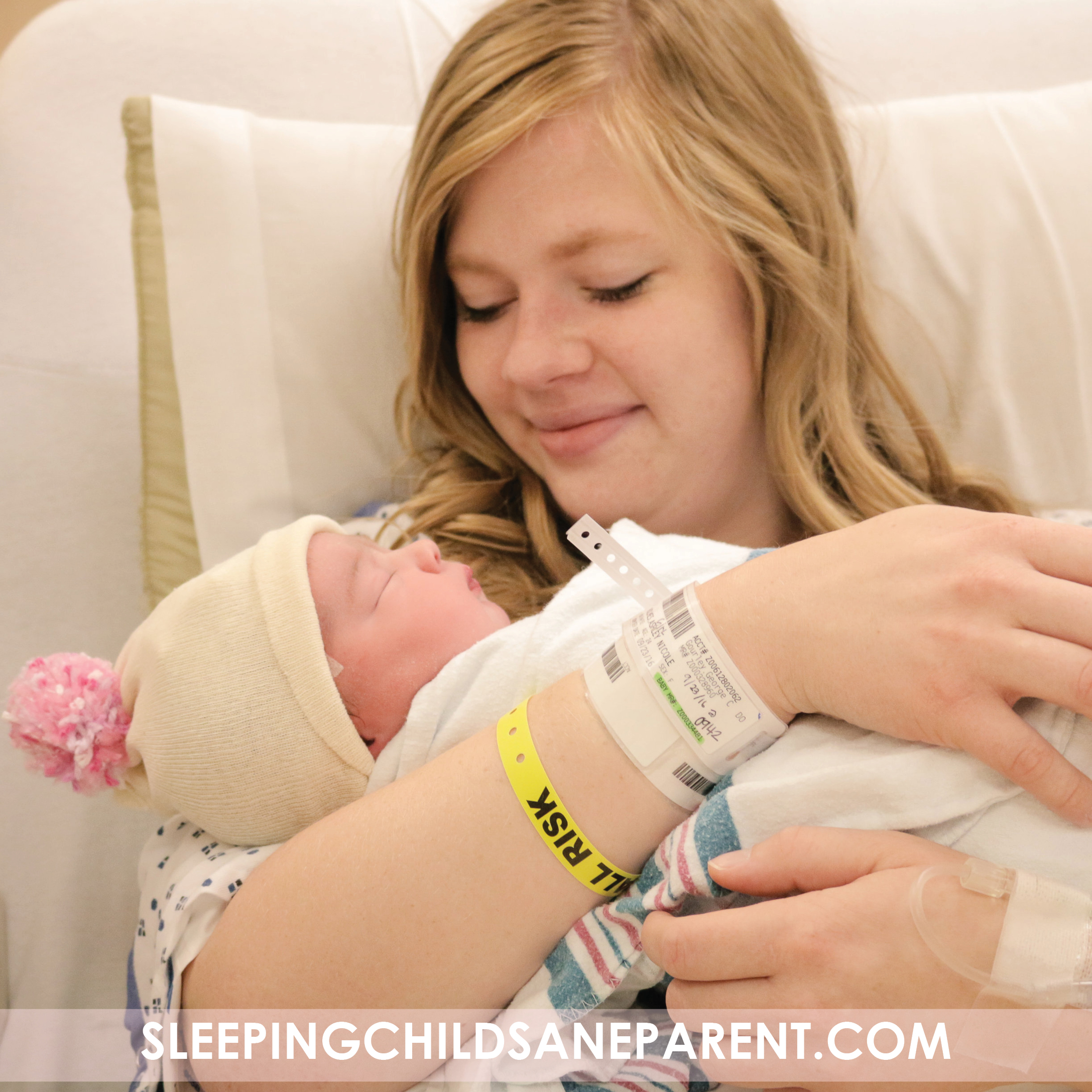There are many different ideas and opinions about sleep training; what works for one family may not work for another family. I am all about making sure that whatever sleep training is done (or not done!) is a good fit for the family. But sometimes people get curious about what methods I've used for my own daughter, so that's what I'm sharing about today. Keep in mind that you do not have to follow my sleep training path -- only do what feels right to you!
Also keep in mind that all of this happened before I had any formal training in baby sleep. Everything I implemented was found in a book or online article until I hired a sleep consultant of my own. So while I would repeat a lot of what I did in the future, I definitely did some of it without being very well-informed.
6 Weeks - Trained Her to Fall Asleep on Her Own
My beautiful daughter, Ada, was born on September 23, 2016. She was a BIG baby (11 pounds even!) with a head of black curly hair. She was perfect!
Ada spent her first two weeks of life in the NICU, and during that time, she seemed to easily sleep in her hospital bed or on my chest or my husband's chest. When we finally got to bring her home, she still seemed to sleep easily and almost all the time. This baby thing was easy!
However, after a couple weeks, it became the norm that for us to get her to fall asleep, my husband or I would have to vigorously rock her back and forth for 5-20 minutes. If we stopped too soon, she would become alert again and the rocking would have to start all over. She still slept great, but it was a lot of effort to get her there.
I knew this was not sustainable behavior, so I set out to find a way to teach her to sleep on her own. Everywhere I looked said that babies needed to be able to "self-soothe," but it was confusing to figure out how to teach a baby to self-soothe (in case you're wondering what "teaching self-soothing" looks like, it's allowing your baby to practice falling asleep without continuous assistance from you). Plus I found information from some sources saying crying is bad, other sources saying crying is fine, and my postpartum hormonal self was just so confused by everything!
Eventually I settled on a version of the timed intervals training method (some know this as the Ferber Method). When it was time for a nap, I would sing her a song as I swaddled her up, cuddle her as I finished the song, lay her down in her cradle, and walk away. I would check on her in intervals of 5, 7, and 10 minutes.
As soon as I'd leave the room, she would start crying, and that's when I'd start a timer. It was so hard to hear her cry! I would wait 5 minutes before going back in, patting her tummy and shhh-ing her, and then I'd leave again. She would start crying again, so I'd wait 7 minutes before going back in to calm her again. She would again cry as soon as I left, so I'd set a timer for 10 minutes, but she always fell asleep before it got to that point. (If she had not fallen asleep, the method would dictate subsequent checks at 10-minute intervals, but at this young age, I probably wouldn't do more than two 10-minute checks before getting her up and trying for a nap again in a little bit.)
After 3 days of following this pattern, I no longer had to do even one check -- she'd fall asleep within 3 minutes completely on her own! With all the stressful parts of being a brand new mom, this was one MAJOR win.
Would I recommend this method at this age for other families? Absolutely -- if you're comfortable with it. Around 6-8 weeks old is when babies start creating associations between how they fall asleep and falling asleep (i.e., if they fall asleep breastfeeding every time, they'll come to expect a breastfeeding session in order to fall asleep; if they are swaddled and sung a sleep song before being laid down, they'll understand that they're supposed to sleep after being swaddled and sung to), so I think this is a great time to start putting Baby to sleep in a way you want him to continue. At this young age, most babies don't have a ton of stamina, so you won't have to endure too many tears, and then you'll get MONTHS TO COME of a baby who falls asleep easily and independently -- that means you'll save yourself from future tears! Highly recommend. I may even try to teach my next baby this skill sooner than 6 weeks old -- while of course paying attention to any cues future baby gives me.
13 weeks - Trained Her to Sleep Through the Night
From about two months old until six months old, Ada took 33-minute naps every time. I knew that longer naps would be better for both of us, but I had trouble finding out how to fix the issue.
In the process of looking for answers, I came across a sleep blog where the writer, Jackie, asked readers to leave specific questions so she could blog about them. Since I was looking for advice very specific to my own child, I took her up on it, and this actually led to a lot of text communication between the two of us for several months.
Although I was trying to solve a nap problem, Jackie actually helped me get Ada sleeping through the night. Jackie and I were both big believers in the ideas set forth in On Becoming Babywise. Both of my sisters had used the book, and I was trying very hard to use the book as well. The basic ideas of Babywise are to establish a pattern of eat, wake, sleep so that Baby doesn't develop a nurse-to-sleep association. The book claims that if you follow this pattern and get your baby in a good groove (repeating the pattern every 2.5-4 hours), he'll be sleeping through the night by 7-12 weeks old.
Ada was now older than 12 weeks and was waking only once for a feeding around 4:30am each night. She started waking later and later for this feed, taking more formula during the day, and taking less formula for her first feed of the waking day because she had already gotten milk at 4:30/5:30am. I decided to give up the 4:30am feeding so she could take a full feeding for her first feed of the day. For a week or so, I would replace Ada's binky at 4:30am instead of giving a feeding. She did fine without the milk, but she was verrrrry reliant on that binky. It got to the point where I was replacing her binky 5+ times before finally getting up for the day. With Jackie's encouragement, I moved Ada to her own crib in her own room, and let her cry it out when she woke at 4:30am instead of replacing the binky.
The first night, she cried for 40 minutes.
The next night, she cried for 70 minutes.
But the third night, she cried intermittently for only 5 minutes.
And just like that, she was sleeping through the night (9pm-7am), and SO WAS I!
Would I recommend this method at this age for other families? I'm a bit more hesitant to recommend this action. Biologically, babies may need two nightfeeds until 6 months old and one nightfeed until 9 months old. I gave up Ada's nightfeed mostly because one book said that babies can sleep through the night by 12 weeks old -- talk about trusting a book! I do definitely think that many babies can give up nightfeeds sooner than they actually do, and many babies can give up nightfeeds before or right around 12 weeks. However, I think if possible, it's better to let these nightfeeds drop on their own, which happens when a baby has a good overall schedule, is getting enough milk throughout the day, and does not have any negative sleep associations. If your baby is waking in the night more often than you'd like, make sure he doesn't have any sleep associations he can't control (nursing, binkies, etc.) and that he has a good daytime schedule, and you'll likely see the nightfeeds disappear on their own.
6.5 months - Trained Her to Take Proper Naps
As I mentioned above, I dealt with catnaps for four solid months. During this time, I read anything I could about how to solve the problem and tried to implement it. Every time she woke up early from a nap, I tried something to get her to go back to sleep. I tried so many things throughout these months! I tried putting her down earlier, giving her the binky, sneaking her the binky, letting her cry it out, putting her in a swing for the whole nap, putting her in a pitch black room for her nap, holding her to sleep the whole time, and vigorously rocking her back to sleep after she woke. If anything ever worked, it only worked for a day or two. I just didn't have enough knowledge about all the WHYs and HOWs of sleep training.
After four months of this, I happened upon a sleep consultant in one of my many internet searches. I wasn't looking for one, I was just looking for answers. I told Pam all about everything I had tried to get Ada to take proper naps, and I also told her I didn't understand the issue because Ada fell asleep independently AND slept through the night (the two most common sleeping problems), so why on earth couldn't she nap?! Pam assured me that she could fix the problem, so I decided to take the chance and spend the money.
Teaching Ada to take consolidated naps mostly involved darkening her room further, finding the sweet spot for how long she should be awake between each nap, and instituting Crib 60. I used the extinction method anytime she was supposed to be asleep, which meant that if she was awake and crying, I left her to do her thing and did not check on her in person (though I was constantly watching the video monitor!). In a matter of two weeks, Ada was finally taking nice, long, age-appropriate naps 90% of the time, and I was a brand new mama!
Would I recommend this method at this age for other families? Of course! Most experts agree that by the time Baby is 4-6 months old, it's okay to allow some crying for the purpose of sleep training. What I do not recommend is running yourself ragged by trying everything, like I did before hiring a consultant. Babies need consistency to learn good sleep habits, and when you're unsure about exactly how to implement all the things you're reading about, it's more likely that you'll do it incorrectly and give up prematurely.
Even before my formal training, you can see that I was comfortable with crying methods. Not everyone is, and that's fine! But I definitely think that the more crying you can tolerate, the quicker you can fix your baby's sleep problems (though make sure to time things right in order to hear as little crying as possible).
All the research I have done on crying methods just leads me to believe even more that a baby who lives in a loving home will suffer no emotional damage from crying done during sleep training. My daughter is proof! Although she cried during sleep training, she loved me throughout training and to this day. She learned fantastic sleeping skills early on because I trained her to do so, and as a result, we're both much happier and well-rested. That's all I want for other families!






